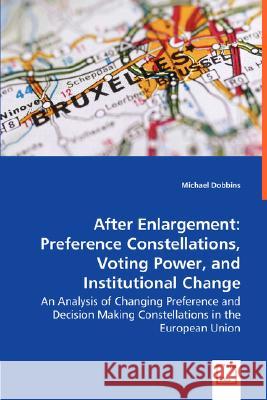After Enlargement: Preference Constellations, Voting Power, and Institutional Change » książka
After Enlargement: Preference Constellations, Voting Power, and Institutional Change
ISBN-13: 9783836477789 / Angielski / Miękka / 2008 / 132 str.
It is frequently assumed that intergovernmental negotiations in the European Union will become more tedious and complex in light of the growing number of states and interests. The goal of this study is to measure the preferences of the new member states along several individual political dimensions in the EU and to compare these preferences with those of the current members. On the basis of the data gathered through interviews and structural statistics, prognoses will be made on the further course of integration along several important conflict dimensions in EU decision making. This analysis serves to establish whether such conflict lines will be intensified and whether the previous voting coalitions in the Council of Ministers will be modified in the course of enlargement. The ultimate aim is then to present different decision making scenarios for individual policy areas so that future developments in the EU can be anticipated and modelled.
It is frequently assumed that intergovernmental negotiations in the European Union will become more tedious and complex in light of the growing number of states and interests. The goal of this study is to measure the preferences of the new member states along several individual political dimensions in the EU and to compare these preferences with those of the current members. On the basis of the data gathered through interviews and structural statistics, prognoses will be made on the further course of integration along several important conflict dimensions in EU decision making. This analysis serves to establish whether such conflict lines will be intensified and whether the previous voting coalitions in the Council of Ministers will be modified in the course of enlargement. The ultimate aim is then to present different decision making scenarios for individual policy areas so that future developments in the EU can be anticipated and modelled.











